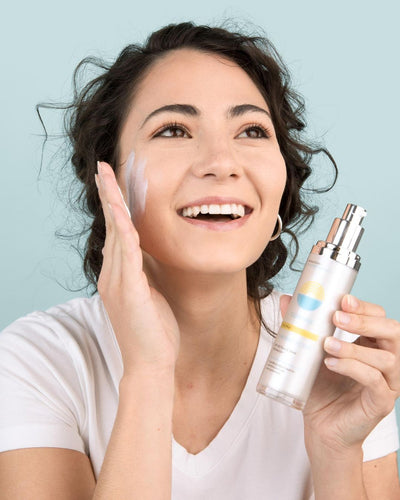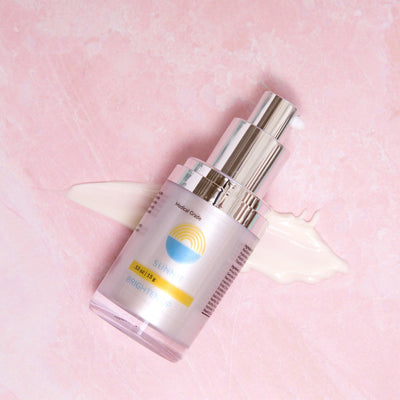Overview
The search for skincare products that work well for your skin type can be difficult to do over the counter, especially for those with sensitive skin. Fortunately, this does not mean that we lost all hope to find products that are clinically proven to work to yield results on the largest organ in the body.
Medical-grade skincare products might be the solution for whatever your problem may be, whether you are seeking out anti-aging products, solutions for discoloration or rosacea, acne flare-ups, or any other skin issues that may arise.
Dermatology continues to expand its knowledge base with new studies every day, and the conclusions that scientists come to while engineering medical-grade products might also signal the conclusion to your skin struggles.
While it is always a positive to have a consistent skincare routine of any sort, most drug store brands simply do not hold up in quality to many of the medical-grade products on the market. This is true whether you are looking for a cleanser, an eye cream, sunscreen with high SPF protection to keep your skin free of fine lines, or any other goods.
Medical skin care products are often touted by celebrities and social media influencers as really working towards their flawless complexions. Despite their notoriety and visible results, accessibility to knowledge on medical-grade facial products is limited.
Read on to find out exactly what medical-grade skincare is, why it is important for healthy skin, what it is made of, and the absolute best medical skincare brands and lines on the market.
What Is Medical-Grade Skincare?
Medical-grade skincare is a type of product that is engineered to medically treat specific skin conditions. It is often prescribed or suggested to a patient by a dermatologist (though plenty of times, it can be purchased on the internet), and in treating skin medicinally, will produce positive cosmetic results, as well.
The conditions that medical-grade skincare intends to treat could include any of the following common skin issues:
- Acne
- Discoloration
- Fine Lines
- Rosacea
- Sun damage
The mark of medical skincare is its high concentration of active ingredients, which dive deep into the skin to directly target the source of the issue.
What Is the Difference Between Medical-Grade Skincare and Regular Skincare?
For medical-grade skincare versus skincare products that you can purchase OTC, there are a few key differences to note.
First, medical skin care products must undergo extensive testing to ensure they are not only safe for human skin but are an effective prescription that treats the condition as intended. Products that you can buy at your local drugstore do not undergo this same degree of testing for both safety and effectiveness.
To complement this point, the concentration of active ingredients is a factor that differs between the two types of skincare. Medical skincare products undergo several rounds of clinical testing to be FDA-approved and so these medicinal items are allowed to contain a high concentration of the ingredients that will do the most work to alleviate skin conditions.
OTC products, on the other hand, do not undergo multiple rounds of professional testing to be sold, and so the FDA will only allow them to have small levels of active ingredients to avoid any harm that the strong components can cause in reacting with the rest of the formula.
Over-the-counter skin care can also not penetrate below the top layer of the skin, which only allows for surface cleansing and moisturizing without addressing the root of the issue.
Some medical-grade products also contain more ingredients for more thorough and deeper absorption of the active ingredients. This is not always the case, but it is certainly a commonality in medical skincare. It is also common to find that the components of medical skincare often take significantly less time to degrade, making their shelf life longer and the investment more worthwhile.
It is important to note that luxury skincare products are not the same as medical-grade skincare products. There are quite a few different brands that sell luxury skincare products over the counter, and they may seem to be as effective as medical-grade based on the high numbers on the price tag. But this is not the case, as luxury products do not undergo the same testing and do not contain the same amount of active ingredients.
What Is the Difference Between Medical-Grade Skincare and Cosmeceuticals?
Cosmeceuticals, like medical-grade skincare, undergo testing at their labs to a certain extent and contain a higher concentration of active ingredients, much like a medical-grade facial product does. However, they function as a cosmetic product and not for treating a medical condition.
While cosmeceuticals might be more clinically effective than an OTC product, they are not always FDA-approved, and they might fit more into the luxury skincare market. Their higher concentration of active ingredients may still be lower than a medical skincare brand, and they do not undergo the same extensive research as a medical skincare brand.
This does not mean that you can't use a cosmeceutical to create healthy skin. In conjunction with a dermatologist-approved skincare routine, they can produce wonderful results as long as you tailor the regimen to the specific person.
If you decide that medical skincare is for you but lack a dermatologist to fill a prescription, you may purchase dermatologist-approved products on Dermstore.
Why Do You Need to Use Medical-Grade Skincare?
There are a plethora of benefits to using medical-grade skincare in your routine. The formulations and the deep penetration of the ingredients allow people with any skin type or skin tone to look and feel healthier.
Firstly, the penetration of active ingredients into the dermis when using a medical-grade skin cleanser will allow for a deeper cleaning than OTC products, except without all the harshness that causes even more damage to the skin in the long run.
If you elect to use a product you have purchased at your local drugstore since it is not eligible for FDA approval, it cannot penetrate past the top layer of your skin. The deeper layers of skin must be clean and moist to prevent future flare-ups of the condition rather than simply providing a temporary solution.
On the topic of stopping future flare-ups in their tracks, medical-grade cosmetics are an investment that preserve skin health in the long run by taking care of it now. For example, medical skincare brands will often manufacture non-comedogenic sunscreens that will not make their sensitive skin break out, and in preventing UV rays from penetrating the skin, they will prevent the person from needing more products for fine lines later on.
The same goes for the lack of harshness in medical-grade products. The skin will not suffer any more damage from its care routine, and it will avoid more expensive care in the future by keeping the skin happy and healthy for a longer time. So, medical-grade skincare products are an investment that really will pay off in the long run, both financially, cosmetically, and health-wise.
Common Medical-Grade Ingredients
The ingredients that make medical-grade skincare special show up in the formulations. Below, find only some of the common ingredients in medical-grade facial care listed:
- Vitamin A, AKA Retinol: Retinoids produce collagen that reduces the appearance of wrinkles, fine lines, and dark spots.
- Vitamin C: This vitamin is known for its ability to prevent sun damage to the skin, as well as treatment areas of discoloration. Some have even treated and prevented acne with vitamin C.
- Ferulic acid: This boosts the effectiveness of other antioxidants in the skin and prevents signs of aging and wrinkles.
- Kojic acid: This fungus-based acid can fade dark spots and repair sun damage, as well as kill the bacteria that cause acne.
- Hyaluronic acid: This acid hydrates the skin and helps give our skin a youthful glow.
- Vitamin E: Also called tocopherol, this vitamin is a powerful antioxidant that can reduce sun damage. It also retains skin moisture.
- Niacinamide: A form of Vitamin B, it helps retain and build up keratin in the skin, which in turn keeps skin healthy. It also prevents redness and flushing.
These are just a few of the active ingredients that you can find listed on some medical-grade skincare products. It is then no wonder that the high concentration of these standout components is part of what makes these medicinal products so effective.
Popular Types of Medical-Grade Products
Medical-grade products come in many forms for different applications and distinct purposes. Find some of these types listed below:
- Eye cleansers: Eye cleansers soothe and cleanse the skin around the eyes and along the lash line, where oil and bacteria can build up.
- Eye creams: Eye creams moisturize the skin around the eyes to keep it plump and youthful. It also prevents fine lines.
- Neck creams: Neck creams prevent sagging skin and deep wrinkles from setting into the delicate skin of the throat.
- Chemical peels: These peels prevent fine lines and treat scarring and spots of hyperpigmentation.
- Facials: A facial is a well-rounded, deep cleaning, moisturizing, and stimulating treatment.
- Cleansers: Cleansers deep-clean multiple layers of the skin.
- Sunscreen: Sunscreen will protect the skin from UV radiation.
- Exfoliators: Exfoliators will remove dead skin cells and unclog pores.
Consult any directions that come with the product so you can find the intended application of these types of products. There is most likely a certain process of applying them. Speak with your dermatologist for more information.
Popular Medical-Grade Brands
Some popular medical-grade skincare brands are renowned for their effectiveness. These brands include:
- Sunnie: Founded by Dr. Alexis Parcells, a board-certified plastic surgeon to create youthful skin for every age.
- iS Clinical: This well-advertised brand has a four-step process to optimize a person’s complexion: cleanse, treat, hydrate, and protect.
- Skinceuticals: The three pillars of “prevent, protect, correct” define this company’s mission to create healthy skin.
- Augustinus Bader: Professor Bader, a renowned biomedical scientist, founded this company with his healing technology.
- Dr. Sebagh: This doctor of cosmetic medicine create a skincare line that focuses on the face and neck age maintenance.
Be sure to consult your dermatologist before adding any of these brands into your normal skincare practice.
Medical-Grade Skincare Routines
To incorporate medical-grade skincare into your optimal skincare routine, the crafting process needs to start with the professionals. Consult your dermatologist to determine a starting point for your daily routine, and depending on how your skin responds, they will be able to tell you what to do from there.
Creating the perfect routine starts with targeting a single issue. For example, if your key concern is acne, you will want to focus on that when choosing which products to incorporate. If you want to target hyperpigmentation beneath the eyes or wrinkles around the lips, you’ll have a different starting point. Often, one medical product from the line will do the trick well enough, so only the investment in that single product may be necessary.
Make sure to speak with your dermatologist about your intended approach and the product line before making your decision, though, and remember that on top of medical-grade skincare, cosmeceuticals are a lovely supplement to the process of creating healthier skin.
The Latest Insights & Analysis About Scar Care
Acne scars, scars from surgery or c-sections, as well as other scarring, can be difficult to treat, and medical skincare may not always be the sole solution to this very frustrating problem. But there are a few modern treatments that your dermatologist might recommend if you are struggling to reduce your facial or body scarring. Some of these include:
- Scar surgery: Acne scar surgery allows a dermatologist to lift the depressed scar from the face, bringing it closer to the skin and making it less noticeable.
- Resurfacing: Chemical peels, laser skin resurfacing, and microdermabrasion support the growth of new skin cells to replace old scar tissue.
- Fillers: A dermatologist will fill a depressed scar with collagen to plump the skin and reduce the scar’s appearance.
- Skin tightening: This recently developed technology uses radiofrequency to tighten the skin and reduce the scar’s appearance.
- Needling: This process stimulates collagen production in the body.
- Injections: For raised scars, in particular, a dermatologist might inject medication directly into the scar to flatten it.
- Scar creams: as with many skin issues, there are different types of cream to aid in the healing and minimization of scarring. Often, these creams include centelline and silicone to keep the tissue hydrated.
Of course, your doctor may be able to point you to the product that is right for your specific scarring issue. After all, acne scarring and scarring due to an automobile accident will need radically different treatment plans.
Conclusion
Medical-grade skincare is becoming increasingly popular, and with very good reason. These products and treatments are thoroughly vetted through clinical trials to ensure that the highly active ingredients are functioning properly to treat the exact issue they target, whether it be acne, premature signs of aging, discoloration, sun damage, or even rosacea.
This type of skincare is a better choice than OTC products, which are not as thoroughly tested and do not penetrate past the first layer of skin, and are not allowed to contain high concentrations of active ingredients like retinol and vitamin C.
If medical-grade skincare seems like the right decision for you, then you would be well-advised to consult your dermatologist to create a new routine that features a medical-grade product.




